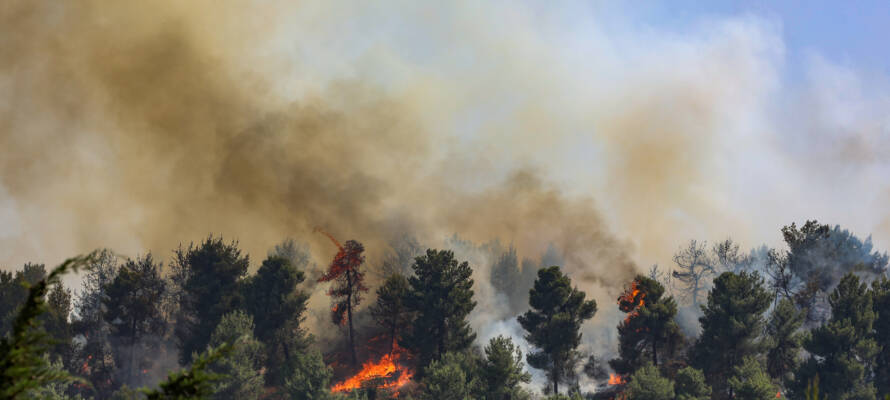Will Israel be able to avoid war with Hezbollah?
By Hugh Fitzgerald, Front page Magazine
Consumed with its war in Gaza, and the need to achieve both its goals — that is, to finish off Hamas as a military force, and to have all of the hostages still living to be returned — Israel has been holding back from a major operation in the north, despite the fact that Hezbollah keeps up a steady barrage of rockets, most recently firing 250 of them at northern Israel within 24 hours.
The IDF will get to Hezbollah, in a major way, and in due time, but for now it is still in the process of taking apart what it believes are the last four intact battalions of Hamas operatives, hiding in Rafah, well aware that they have to act now, before a not-impossible ceasefire descends — although at the moment it looks like Hamas, demanding absurd changes to the latest deal proposed by Biden, will do as the Arabs so often do, which is to “never miss an opportunity to miss an opportunity.”
The IDF has withheld responding with its full fury to the daily rocket barrages on northern Israel from Hezbollah.
Instead, it has made do with tit-for-tat responses, hitting a half-dozen Hezbollah targets one day, and a dozen the next, but all of them carefully calibrated so as not to set off a full-scale war.
It’s not a war Hassan Nasrallah wants. On June 11, Israel was able to strike a command-and-control center in the village of Jouaiyya and to kill Taleb Abdallah, the most senior Hezbollah commander killed during the last eight months of hostilities.\
In response, Hezbollah fired 250 rockets at Israel, with 100 of them fired in a single continuous barrage.
There were no Israeli casualties, but the rockets started fires in the north that so far have consumed several thousand acres.
Israel has responded with attacks that are more damaging — but only slightly so — than the previous Hezbollah attack.
But Israel will have to soon make a decision as to whether to launch a major campaign, with a ground invasion of south Lebanon, against Hezbollah.
The reason is simple: right now much of Israel’s territory on and near the Lebanese border has been emptied out of its population.
Sixty thousand people from the north have been displaced for the last eight months, having been forced by Hezbollah attacks to move south to live in hotels, or with relatives or friends.
They cannot go back; the Hezbollah attacks make it too dangerous.
About the same number of Israelis, who had been living in the south of the country along the border with Gaza, have left their homes to avoid rocket attacks from Hamas.
This means that Israel’s inhabitable land area is “shrinking,” with parts of the country, along both the Gazan and Lebanese borders, now largely empty.
When Hamas has been dismantled, and the Gaza campaign at an end, Israelis will be able to return to their homes in the south.
But in the north, Hezbollah still remains an active threat, and Israelis are not going to return to homes in the border area with Lebanon until Hezbollah’s constant attacks with missiles and drones come to an end or, at least, are reduced to their pre-October 7 frequency.
Right now, the IDF has contented itself with answering each barrage with slightly stronger attacks of its own on command-and-control centers, on weapons depots, and on Hezbollah fighters’ positions.
There are many in the IDF high command who now think that war with Hezbollah cannot be avoided, that in delay there lies no plenty, because Hezbollah is acquiring more and better weapons, some from Iran, via Syria, and some, such as drones, made in its own weapons factories.
As soon as it is determined that the Gaza war is coming to a successful conclusion, the IDF must launch a ground offensive into southern Lebanon, along with massive waves of airstrikes to which Hezbollah has no adequate defense.
The IDF needs to reduce Hezbollah’s stockpile of 120,000 to 200,000 short-range guided ballistic missiles, short- and intermediate-range unguided ballistic missiles, and short- and long-range unguided rockets, to manageable proportions.
But Hezbollah’s Nasrallah may come to his senses before that IDF ground offensive begins.
He has seen what the IDF has done in Gaza, with 80% of the Strip’s built surface heavily damaged or destroyed, and does not want to bring that kind of destruction to Lebanon, where Hezbollah is already hated by the Christians, the Sunnis, and even by some fellow Shi’a, fr bringing such destruction in the past to the country.
Nasrallah may decide to ratchet down considerably the attacks from Hezbollah.
He is known to be very worried about his own safety; he moves every few days and has joked that “even I don’t know where I am sleeping tonight.”
And he has been made even more anxious by the recent pinpoint killing of that senior commander, Taleb Abdullah (Abu Taleb). Obviously, the Israelis know a great deal about the location of Hezbollah’s higher-ups. Nasrallah does not want to be a martyr.
And he remembers the war with Israel in 2006, which he later said he would never have started had he known how hard Israel would hit back.
If the Hezbollah rocket barrages do not die down or cease, then Israel — once the Gaza war is essentially over — will be ready to launch airstrikes, send into the sky over Lebanon death-dealing drones, let loose endless artillery barrages, and also start a ground invasion with hundreds of tanks, all dedicated to destroying much of Hezbollah’s massive arsenal, and to pushing Hezbollah operatives much farther back from the border with Israel.
The IDF really has no choice. Those 60,000 Israelis need to return to their homes.
Israel needs to reclaim, and make habitable again, the western Galilee.
MAKE THE LAND OF ISRAEL EVEN MORE BEAUTIFUL!
PLANT YOUR VERY OWN FRUIT TREES IN ISRAEL!
Farmers near the Gaza border lost family, friends and workers. Spring is here, and they desperately need help to replant the farms. Join us in blessing the People and Land of Israel.
“I will ordain My blessing for you…” (Leviticus 25:4)



